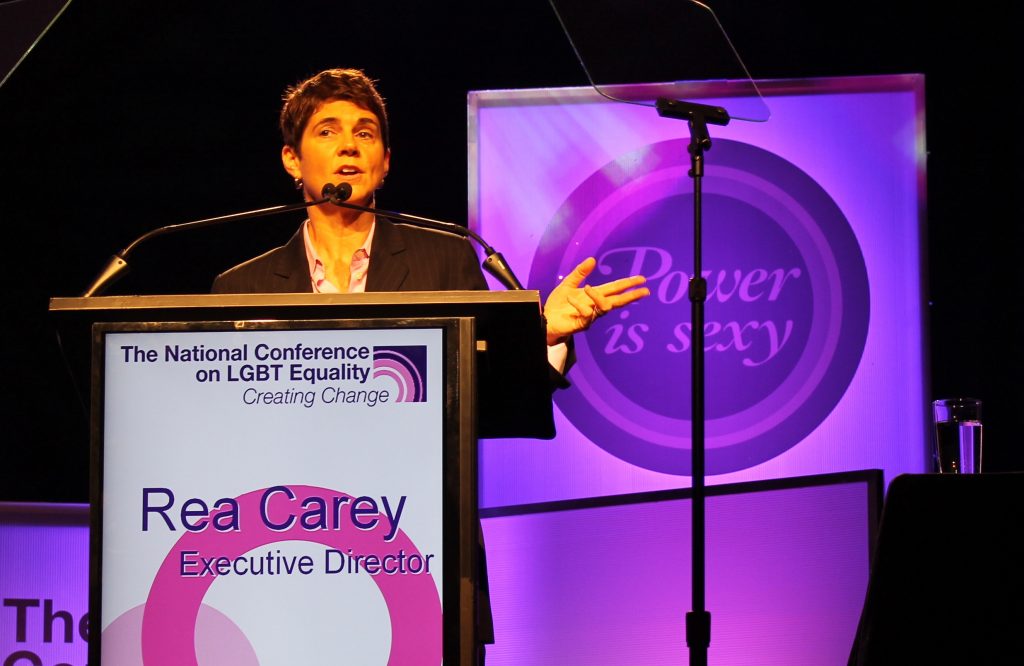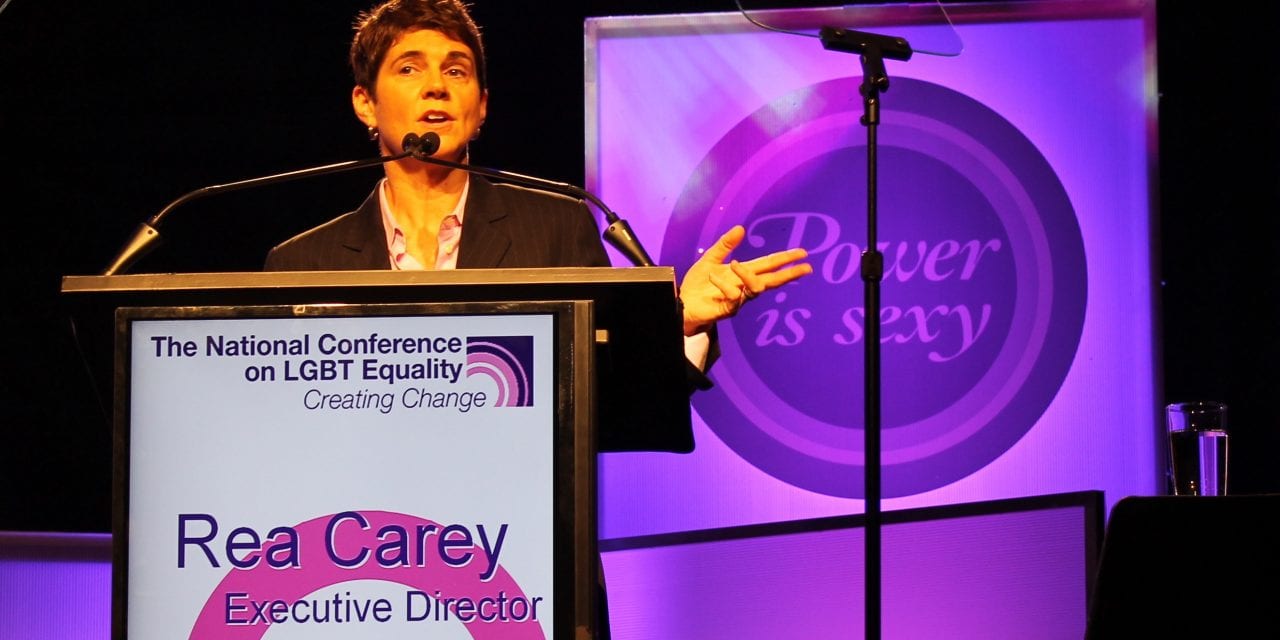
Rea Carey, executive director of the National Gay and Lesbian Task Force, speaks about the future of the LGBT movement at the Creating Change conference in Houston. (Jessica Borges/Dallas Voice)
HOUSTON — Rea Carey expects the momentum from 2013 to carry over and encourage more change and success for the LGBT community this year in areas like immigration reform, healthcare coverage and nondiscrimination legislation.
Carey, executive director of the National Gay and Lesbian Task Force, called on the 4,000 people at the National Conference for LGBT Equality: Creating Change to reflect on the advances last year and fight for more in the coming months during her State of the Movement speech on Friday.
“2013 showed us and this country that the wins of 2012 weren’t a fluke,” Carey said. “The momentum is in favor of progressive change. We are here to stay, our progress will continue and we will not allow this country to turn back.”
One of the Task Force’s goals was the to end workplace discrimination for LGBT employees, and Carey said looking at the ordinance the San Antonio City Council passed last fall was an example of progress, as was the U.S. Senate “finally and resoundingly” passing the Employment Non-Discrimination Act. But with the U.S. House yet to take up ENDA and important gains in marriage equality with the number of states where gays can marry doubling to 17, Carey said dialogues about those issues, as well as immigration reform and transgender rights, must continue for more success.
“To be sure 2013 was big. And our work is far from finished in ensuring that all LGBT people and their families can one day taste the sweetness of freedom,” she said.
Despite the marriage equality successes, there are 29 states where gays and lesbians can be fired for their sexual orientation and 33 states where people can be fired for their gender identity. Carey said marriage equality is a vital part of the LGBT movement, but it cannot define how far along the progress is in the fight for equality.
“Sure you can get married, but put a picture of your wedding on your desk at work, and a bigoted supervisor can get you fired,” she said.
Carey also mentioned the lack of support from President Barack Obama in Tuesday’s State of the Union address, where he failed to mention an executive order requiring federal contractors to have LGBT protections for employees.
“And since the president neglected to say it on Tuesday night, I will say it loud and clear: We need an executive order banning discrimination against the millions of LGBT people who work for federal contractors,” Carey said to applause. “Mr. President, take out your pen and line it up with your stated values.”
Carey called on the conference attendees to look to other issues that affect the LGBT community like racial justice, reproductive rights, prison reform, fair pay and immigration, calling them all “LGBT issues.” She also cautioned the community to not judge each other as “good gays” and “bad gays,” comparing people who marry and start families to others who are HIV-positive.
“Let’s not lose the fact that long before Stonewall our very insistence on our sexuality, on the uniqueness of how we create families, on the beauty of our queer culture and how it helped to make this community and this country strong,” she said. “Let’s not lose sight of that.
“We must not ignore our own moral compass at the very moment when looking in many directions is what is called for,” she added. “We must not lose ourselves at the very moment we are finding freedom. Instead, we must think big about where we go from here. We have spent decades building power. Now we must use it and use it with care and compassion and love.”
The future of the movement should be viewed in terms of what kind of movement LGBT advocates can create that benefits everyone, Carey said. She said the movement should focus on all issues of equality that prevent division among the haves and have-nots, even in the LGBT community. And the movement should take an international focus as countries like Russia and Uganda continue to take aggressive actions and pass legislation that harm and threaten the safety of LGBT people.
“We also can’t forget our relationships to our friends around the world,” Carey said, adding that international LGBT issues will still exist after the Olympics are over. “Those of us in the United States have much to share and must to learn when it comes to political and social change for LGBT people.”
Even with various issues affecting the LGBT community, Carey said the movement’s future is about possibility, referring to trans actress Laverne Cox, who addressed the conference Thursday, and refers to herself as a possibility model instead of a role model. And once possibilities are laid out, Carey said it comes down to the collective power of the LGBT community and how to organize and use it.
“Our responsibility as a people in this moment is to accept the responsibility, the privilege and the power of our progress on issues such as marriage equality and to use it well to call attention to the fact that our work for justice, for us and for all, is not done,” Carey said.
“We need more change, we need more change, we need more change,” she chanted, and the crowd joined in and chanted with her. “We do need more change, friends. Together we can create more change and we will be free.”











